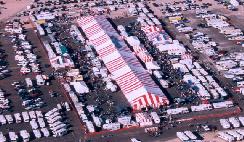Chapter 5 - Leisure Time and How to
Live With It
This chapter contains some fatherly advice on leisure time ... and how you had better have some sort of hobby if you're planning to fully retire. In this chapter, I go into some ideas we have picked up on how to make a little money as you travel ... mostly simple ideas that will bring in only a few dollars, but that you probably won't have to pay taxes on.
Our five-month trip was fairly close to full retirement, since I had planned to spend a large amount of my time doing absolutely nothing except enjoying the scenery. I discovered something about 30 days into the trip -- I very quickly got bored with doing absolutely nothing. Also, I am a believer in the theory that, as you grow older, inactivity leads to an early demise and activity leads to a longer, happier life. If you're planning to retire, you'd better have some kind of hobby -- preferably something you can do outside under the awning, so you can enjoy the scenery while doing your hobby. Joyce has the perfect one -- oil painting. While in the Florida Keys, she tried to teach me how to oil paint but had little success. I guess that is because my background is in Mathematics and computers, so I expect that following a specific series of steps will lead me to a known result. I could see the color I wanted on the ocean, mixed together the colors to produce it, and ended up with the wrong color. After struggling with it for a few hours, I decided that painting was Joyce's hobby.
On our trip, I guess my hobbies were fishing, hiking, and reading pocketbooks. The trouble with fishing was that the licenses cost more than we wanted to spend. The trouble with hiking was that I didn't like to hike alone, so couldn't do it while Joyce was painting. I did read alot of pocketbooks, mostly mysteries and spy books. I had a computer terminal in the motorhome, but this required getting to a telephone to connect to a computer. Except for this limitation, working on the computer would likely have been my hobby. Update: As it turns out, "computerizing" has turned out to be one of my major past-times, although now I do it with a laptop instead of the old VT100 I used in my travels in the '80s. For more on this, check out my Online-On-The-Road page.
Since our trip, I have given the hobby thing alot of thought and have come up with a set of hobby objectives. First, I prefer a hobby that I can make some money from -- this will always leave the possibility open that my hobby might really start making money and that I will finally get the riches that I deserve. Second, I would like a hobby that produces something that allows me an income tax deduction or at least does not itself result in more taxes. I figure I have paid taxes for 35 years and have contributed my fair share to the support of the country and the Government. Third, I would like a hobby that I enjoy -- I have not enjoyed my occupation for several years and certainly would not voluntarily enter an area that would extend my period of non-enjoyment. Fourth, I prefer a hobby that produces something that helps or brings enjoyment to others. I have always enjoyed building things that either help others in accomplishing what they have to accomplish or that bring enjoyment/entertainment to others. If I can get rich while satisfying all (or some) of these objectives, that would be fantastic.
Both Joyce and I now have a variety of hobbies identified for pursuit while we travel. Joyce is a bit ahead of me, since she has already begun on alot of her hobbies in her spare time. I have not had as much spare time, so have done more planning than doing. I have listed some of our plans below in hopes that they may provide you with some ideas as to what might be appropriate for you.
So, there are a few ideas. One more suggestion that I think is appropriate for everyone -- form a company. Joyce and I formed one a couple of years ago called R&J Enterprises (that's Robert and Joyce). We went to a tax advisor and were told that all we really needed to do to start a company was to get stationary with our letterhead on it, get some business cards, and have a "company" checkbook. The "company" checkbook is not a separate account, but simply an additional checkbook on our personal account. The checks are a different color and we enter all of the R&J income into it instead of our regular books. We also filled out a form SS-4 that we got from the IRS in order to have a Federal Employer's Identification Number. This number is needed when you fill out the Schedule C on your income tax -- yes, you will either have to learn how to do a Schedule C or pay a tax man to do it for you.
Maybe you're wondering why you would want to form a company. The main reason is to have something to deduct your expenses against -- a secondary reason is that you may someday actually start to profit from it. Our company isn't doing too much the first few years. Joyce does some floral design work for shops around town as an independent contractor (i.e., they don't take FICA or income tax out of her paycheck), so there is some income. During these first few years, we are buying the equipment we will need to make money after we semi-retire. Consequently, our equipment expenses during these years will probably surpass our income. The IRS doesn't worry about this too much unless you go more than five years at a loss -- then they begin to question whether you really have a business or not. We expect to retire before that point and to actually start to show a small profit. In the meantime, we file a Schedule C as a proprietorship and can deduct the expenses. If they surpass what R&J makes, these expenses can be deducted against my salary at my "day job." Update: A couple of other notes from my tax audit. Firstly, the auditor read this book as part of her appraisal of my deductions and suggested that I probably shouldn't be giving tax advice in the book. I'm assuming you'll talk to a tax advisor before doing any of this stuff and not just take my word for it that it's a good idea. Secondly, I learned that if you have several different avenues of revenue as described above, you're supposed to do a separate Schedule C for each. Again, talk to a tax person if you have doubts.
One idea that works well whether you've got your own company, are working for someone else, or are retired is to consider every dollar you spend to decide if there is some way you can deduct it. For example, if you take a trip is there some way it could be considered a business trip -- or an interview trip? If you buy a movie camera, will it be used in your business? Can some of your automobile expenses be deducted? Likewise for your home maintenance expenses, telephone bills, etc. If you give money to your children, consider whether they are doing things for your "company" that deserves a (deductible) salary. Whenever you go to make any purchase over a couple of dollars, you should be thinking about whether there is some way to purchase the item that would allow it to be a deduction on your income taxes. You'll be surprised at how this mentality will increase your deductions (legally) and save you money in the long run. Add-on: One reason I spend so much time talking about tax deductions is that I realized that taxes probably represent the single largest expense when you're in retirement. Any ways you find to reduce your taxes will logically significantly decrease your overall expenses.
Well, that about wraps up the chapters on how to get by for under $1000 per month. Now you get to the good stuff that gives you some ideas on how you might be able to retire early. Wait! One more add-on: I've got a whole section on Working While Wandering -- go check it out for some more current ideas.
You're Visitor #
 | ||||
Retire and Travel For $1000 a Month
My First Book
Nothing in this site is copyrighted -- I'd be honored if you'd reuse anything you find here for your website
 | ||||||

